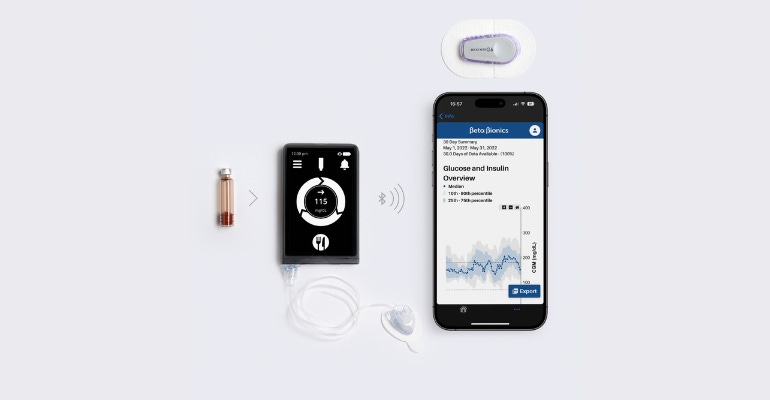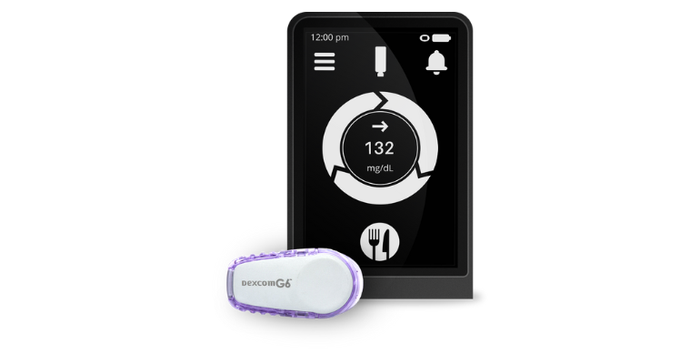Who Will Dominate the Automated Insulin Delivery Market?
Fresh off a $100 million funding round, Beta Bionics is set to challenge Medtronic and others in the automated insulin delivery space.
September 1, 2023

Beta Bionics, an MD+DI reader favorite, has secured $100 million in new equity capital through a series D funding round, putting it in prime position to challenge Medtronic and others in the automated insulin delivery market.
The Concord, MA-based company scored FDA clearance for its iLet bionic pancreas in May. The system is designed to streamline diabetes management and reduce the burden on patients and physicians. The only input required to get started is the user's weight. Healthcare providers no longer need to determine complex settings such as correction factors, insulin-to-carb rations, or pre-set basal rates. For patients, there's no carb counting (iLet users still must be carb aware, however) or calculating insulin corrections throughout the day. The iLet device is designed to determine 100% of the insulin doses. The iLet is paired with the Dexcom G6 continuous glucose monitoring (CGM) system.

"This significant investment represents a powerful vote of confidence in Beta Bionics' mission to redefine diabetes management with user-centric technologies," CEO Sean Saint said. "...We are eager to push the boundaries of what's possible by expanding access to the iLet bionic pancreas nationwide and further develop and test the bi-hormonal bionic pancreas."
The company's series D round attracted new investors Sands Capital and Omega Funds (co-leaders of the round), and Marshall Wace. Previous investors Soleus Capital, Eventide Asset Management, Farallon Capital, Perceptive Advisors, certain funds managed by RTW Investments, ArrowMark Partners, and Pura Vida Investments also participated.
The automated insulin delivery market just got a whole lot more interesting
To be fair, the automated insulin delivery space has always been interesting. But this infusion of capital will help Beta Bionics compete more effectively with the likes of Medtronic and others. The intensive insulin space moving from primarily standalone CGM today to one that is smart dosing through either an automated insulin delivery systems or smart MDI (multiple daily injections).
Medtronic's diabetes business is seeing a long-awaited turnaround, driven largely by demand for the company's MiniMed 780G, an automated insulin delivery system FDA approved in April.
According to Medtronic, the MiniMed 780G system features the lowest glucose target setting (as low as 100 mg/dL) in any automated insulin pump on the market and one that more closely mirrors the average glucose of someone not living with diabetes. With this setting, the pump will "treat to target" and will automatically deliver basal insulin adjustments and autocorrections to a set target, the company said.
Medtronic's pump can also be worn for up to seven days, doubling wear time with advanced materials that help reduce insulin preservation loss and to maintain insulin flow and stability. The MiniMed 780G system is paired with Medtronic's Guardian 4 sensor requiring no finger sticks with SmartGuard technology.
Medtronic CEO Geoff Martha said the company is investing heavily in next-generation durable pumps, smart pens, patch pumps, sensors, and algorithms, and the diabetes business has multiple programs under development. The company also has a next-generation CGM under FDA review.
Que Dallara, EVP and president of Medtronic's diabetes business, said the business has had the highest new patient growth in three years and that's coming from MDI patients as well as competitive switches.
They get by with a little help from their friends
The Beatles' "With a Little Help from My Friends," should be the anthem for the diabetes management market. More than any other medical device sector, partnerships have become the key to success for many smaller insulin delivery players.
Just as Beta Bionics has partnered with Dexcom to pair CGM with its automated insulin delivery (AID) technology, similar collaborations can be found across the diabetes management space. Abbott is partnering with Insulet and Tandem for future integrations in multiple countries, including the United States. Outside the United States, Abbott is working with Ypsomed and CamDiab to pair its FreeStyle Libre 3 sensor with the mylife Loop system.
Insulet's Omnipod 5 tubeless automated insulin delivery system also integrates with the Dexcom G6 CGM. The company recently announced full market release of the Omnipod 5 in Germany.
In May, Embecta announced its partnership with Tidepool, a nonprofit organization, to develop on automated insulin delivery system for people living with type 2 diabetes. Embecta plans to leverage Tidepool’s expertise in diabetes management software to develop the AID algorithm for its closed-loop patch pump system designed with the specific needs of people living with type 2 diabetes (T2D). This focus on the T2D population sets the BD spinoff apart from others in the automated insulin delivery space that are focused on type 1 diabetes patients.
"A large segment of the diabetes community is made up of people living with T2D, however, the existing AID systems are not tailored to meet their unique needs," said Henry Anhalt, Embecta's chief medical officer. "The recent 510(k) clearance of Tidepool Loop — a fully interoperable automated insulin dosing app which started as a patient-led initiative — affirms that Tidepool’s approach to AID system development combines patient insights with a robust diabetes management solution. We believe that the combination of the embecta and Tidepool teams will lead to the development of a user-centric T2D AID system that fills a need for improved glucose management.”
It's no wonder interest in diabetes tech is at an all-time high among the investment community.
"It is clear diabetes tech remains a high priority for the medtech investment community, in part because of the numerous catalysts and rapidly shifting market dynamics," Marie Thibault, a medtech analyst at BTIG, wrote in late June following the American Diabetes Association (ADA) 83rd Scientific Sessions. "We remain bullish on the space and expect sales growth rates to keep outpacing most of medtech."
About the Author(s)
You May Also Like



.png?width=300&auto=webp&quality=80&disable=upscale)
